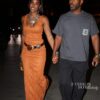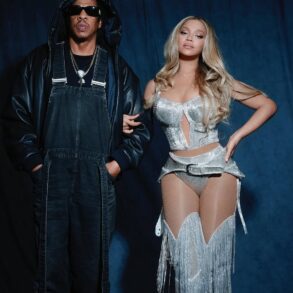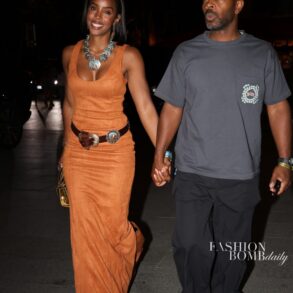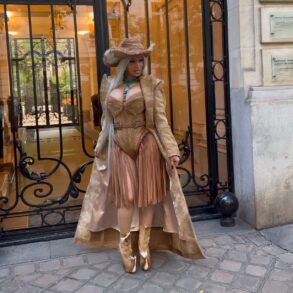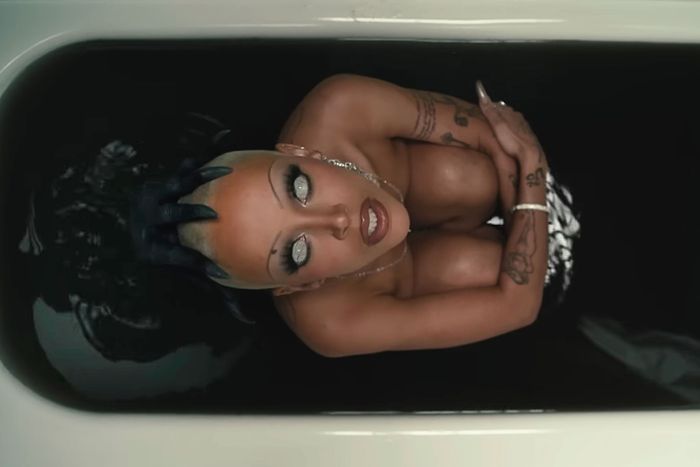
Photo: Doja Cat via YouTube
Doja Cat is a lightning rod for disputes. In 2020, she was accused of lurking in alt-right chat rooms; this year, she was criticized for vaping at the Met Gala. But the months leading up to the release of Scarlet, her fourth studio album, have felt like a dedicated campaign to convince people to quit following her entirely. In May, the 27-year-old rapper, singer, dancer, and internet terror sparked a mutiny when she taunted fans for enjoying her last two albums. “Planet Her and Hot Pink were cash grabs, and y’all fell for it. Now I can go disappear somewhere and touch grass with my loved ones on an island while y’all weep for mediocre pop.” In July, she roasted admirers who refer to themselves as “kittenz”: “If you call yourself a ‘kitten’ or fucking ‘kittenz’ that means you need to get off your phone and get a job and help your parents with the house.” Prompted to say she loves her fans, she replied, “I don’t though cuz I don’t even know y’all.” A week later, a wave of Doja stan accounts deactivated when she responded to allegations of manipulation and grooming surrounding her boyfriend, Twitch star J. Cyrus, by blocking and insulting those asking her to speak out: “I never have and never will give a fuck what you think about me or my personal life. Goodbye and good riddance, miserable hoes. Haha!” Neglecting to perform the dance of gratefulness at key junctures had always been a workable insouciance — it was Doja being Doja, an entertainer who came to us in a meme. But dismissing questions about Cyrus with a smirk was dark, the kind of PR disaster that keeps management up at night.
Fans who stuck it out suspected she was committing to a bit, carrying out a campaign to confound and unsettle. In June, she released “Attention” with a video featuring an image of her covered in blood, symbolizing rebirth but also giving Hellraiser: “You follow me but you don’t really care about the music,” she rapped. August’s “Paint the Town Red” played with occult themes and visuals as it rebuffed fame; by then, whispers of demonic influence — sparked by her tattoo of a monster drawn by Italian philosopher Fortunio Liceti — had worked their way into the songwriting, as art and outrage powered each other in a noisy negative feedback loop. Scarlet is by turns a deliberate provocation for people questioning Doja’s character and a reasonable response to the million divergent sets of expectations tugging on her, part attack and part evasive maneuver. It’s a rap album on the surface, an invitation to stop expecting a performer who is coherent in different forms to continue to conform to whatever shape makes the most people happy.
Scarlet moves with a keen awareness of the iconography of the disorderly pop star, the rulebreakers with shaved heads and alleged blasphemers, and the evolving but eternally self-righteous rage against Sinead O’Connor, Madonna, Britney Spears, and Beyoncé. Doja Cat pushes buttons strategically, portraying a lack of concern for everything that has been said about her this year but also addressing specific points of contention. “Y’all cannot believe I’m not a fiend and that it wasn’t coke,” the mid-album highlight “97” notes, seemingly quashing rumors about a livestream where she leaned out of frame and maybe snorted something. “Fuck the Girls (FTG)” and “Demons” revel in the devil-worship rumors, the former in its verses (“Suck my dick, clit, tits / I’m yelling 666”) and the latter in a video where Doja menaces a woman like a night hag, claws creeping over flesh Nightmare on Elm Street–style. “Can’t Wait,” a hip-hop soul song served over the Honey Drippers’ classic “Impeach the President” break, appears to go to bat for Cyrus, a Louisiana native: “Top down with our ice shining like a snowman / Cook you a crab boil that reminds you of New Orleans / Don’t give any time of day to these cokeheads / We too busy getting experience and exploring.”
Throughout the album, hard staccato syllables add weight to harsh rebukes of anyone who thinks their support buys a say in Doja Cat’s personal or creative journey. A seasoned troll, she channels negative comments into some of her finest rap performances ever. “Red,” an incisive blast of frustration disguised as Bay Area thump, jabs swiftly over Dionne Warwick’s “Walk on By”: “Pop make money, now you try, bitch / You could use a revamp with a new vibe, sis / I don’t need a big feature or a new sidekick / I don’t need a new fan ’cause my boo like it / I don’t need to wear a wig to make you like it / I’m a two-time bitch, you ain’t know I’d win?” (She called her shot. “Red” earned Doja her second No. 1 single.) An excited spite courses through the cadences of “Wet Vagina”: “Kick me out the Met but I really run fashion / All that stressing ’bout me has been giving you acne / Pass the popcorn ’cause I really like rap beef / I got hot songs, that’s why everyone at me.” The slick internal rhymes of “97” are begging for a reaction: “You can hit up PETA to paint on me, make me gorgeous / I’mma take the geese and chinchilla coat on the walk-in / Don’t forget the cheetah print, speed up, come here, record it / If that shit ain’t bleeding and screaming then I don’t want it.” “Demons,” whose blown-out bass and string sample gesture to both MOP and Chicago drill, scorches the earth over a devilishly disaffected second verse: “I’m a puppet, I’m a sheep, I’m a cash cow / I’m the fastest growing bitch on all your apps now / You are tired of me ’cause I’m on your ass now / You are mad at me ’cause I am all they slap now / I can nap now.”
Skipping across hip-hop history, cycling through East Coast boom bap, West Coast G-funk, southern trap, live ’90s soul, and ’10s “trapsoul,” Doja Cat attempts to shake off the attention by climbing out of the box pop fans filed her into while kicking her feet up in a different one entirely. She’s comfortable in hip-hop because that’s where her roots are. Before she graced the rubbery Tyson Trax creations that made her a global sensation, Doja was serving lo-fi beats to study to with “Beautiful,” the formidable opener from her 2014 EP Purrr!; ominous Cali swing in “The Wave,” a 2016 collaboration with Odd Future’s Left Brain and Atlanta rapper Pregnant Boy; and confrontational southern rap in the affected drawl and double-time flows of Hot Pink’s “Rules”: “Look at me like I’m alien, bitch, I’m fucking reptilian.” It was a mistake to look to a musical chameleon and a clapback assassin for a predictable body of work or a reliably chipper public persona. Doja doesn’t give a shit whether or not we like her boyfriend or her hair or even her music. Even when it frustrates, Scarlet is potent as a rejection of any limiting vision of her shiftless creativity. Vocal fry and purposefully loose timing make “Agora Hills” feel like a TikTok parody of a Doja track. The childlike delivery throughout the first verse of “Demons” — “We are enemies / We are foes / Who are you? / And what are those? / You are gross / Percocet got you playing with your nose” — makes the punchlines land like playground snaps. Limber, melodic turns in “Love Life” and “Can’t Wait” catch Doja Cat playing the Rihanna to her own Drake, the Mary J. Blige to her own Method Man. (Scarlet poses as anti-pop, but scanning credits, you’ll find Ayo the Producer, who worked on “WAP”; Kurtis McKenzie, co-producer of Iggy Azalea’s “Fancy”; and Earl on the Beat, the beatmaker behind City Girls’ “Act Up.”)
Scarlet makes it clear that Doja resents the supply-and-demand system she’s been thrust into and that nobody should get cozy in any one manifestation of her art. In “FTG,” she coldly ponders the economics of paparazzi pursuit of celebrities — “You sold ten autographs for the utilities / Y’all take credit, bypassing my abilities / You just here by proxy, you ain’t feeling me” — and grouses about being the shepherd of a flock she never asked to lead. Nobody’s supposed to say what she’s been articulating this year, that pop stars are here to make bangers and not to model morality and kindness for everyone’s children. But going nuclear in defense of Cyrus and cooling Scarlet’s embers with fluff like “Agora Hills” highlights the weak point in this unreadable artist’s nigh-impenetrable armor: The insinuation that life could be peaceful if not for all the nosy, delusional observers in her life.
In lashing out at the devotees who held her down through scandal after scandal, who fended off criticisms of her work with Dr. Luke in the wake of Kesha’s allegations about him, Doja continues to pour gasoline on the fires she lit. By the joyful “Love Life” and the sunny “Go Off,” you wish she devoted less time to the worst comments being made about her. People became emotionally invested in her success, and she is making that as difficult for them as she can. The flak has super-charged the rap skills, complicating Scarlet’s desire to turn the heat down. Doja Cat can top the Hot 100 as a rapper or as a pop star. She can court whispers of dark sacrifices with her videos or shine in the wigs and evocative choreography that people continue to pop for in venues like the VMAs. She can beef with her top listeners over how best to show love or lean into the smothering, scrupulous appreciation. Doja doth what she wilt.
This post was originally published on this site be sure to check out more of their content.


